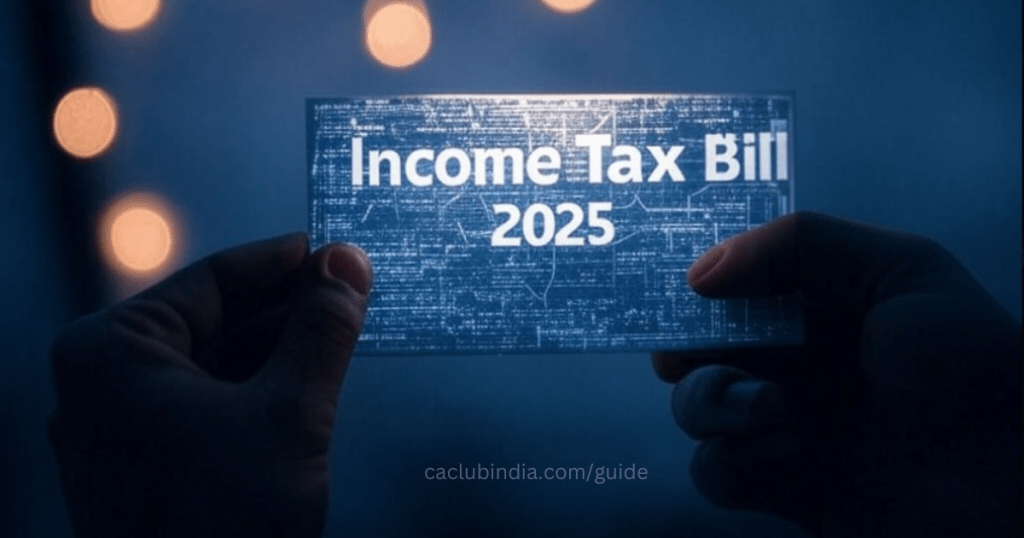The government has introduced the Income Tax Bill 2025, to simplify and consolidate the provisions of Income Tax Act, enhancing clarity, ease of compliance, and modernizing tax administration.
But on 8 August 2025, a news spread on social media that the new Income Tax Bill had been withdrawn by the government and would not be implemented soon.
Many people assumed that the bill was scrapped completely or delayed for years, possibly beyond 2027.
Reality
This interpretation is wrong — the withdrawal was a procedural step, not an abandonment.
Background of the Bill
The bill was first introduced in the Lok Sabha by Finance Minister around 13 February 2025 during the budget session.
This is a major reform after many years, aimed at replacing or significantly modifying the Income Tax Act.
Role of Selected Committee
Soon after its introduction, the bill was referred to a Select Committee for detailed, clause-by-clause review.
Reason for Withdrawal
The February 2025 draft already went through significant changes during committee review.
Incorporating all these changes into the old draft would be difficult.
Government’s Solution
Withdraw the February draft and present a fresh, updated draft instead of amending the old one repeatedly.
New Draft Timeline
Finance Ministry confirmed the updated draft will be presented next week (likely 11 August), including Select Committee recommendations.
The revised draft will integrate all Select Committee recommendations for smoother passage in Parliament.
Implementation Timeline
If bill passed in August 2025, the new Act is expected to come into force from 1st April 2026.
Impact on CA/CMA Students
When will it be applicable?
It will be applicable for May 2027 main attempts onwards.
There will be no immediate effect on students appearing for May 2026, January 2026, or September 2026 attempts.
No drastic syllabus changes — core concepts remain the same.
What are the changes made in Bill?
Clubbing of Income
There is no major changes in the methodology of clubbing of income in the new bill. The provisions remain simplified, with exemptions retained for certain transfers and income types (e.g., income of disabled minor child).
Deeming Provisions
There are no changes in the deeming provision from sections 68 to 69D only simplification with clearer definitions, including the inclusion of negotiable instruments.
Section 69B Split
Investment part merged with Section 69.
Asset part merged with Section 69A.
Section 69D Updated
- Now explicitly includes negotiable instruments along with hundi.
- To ensure clarity and reduce disputes.
- To provide certainty the linkage to section 115 BBE specifying rates of tax has been included in this chapter itself as a new section.
Reduction of Litigation
The bill aims to reduce litigation by removing ambiguities, clarifying provisions, and offering more certainty in tax calculations and legal interpretation.
Taxing Unaccounted Cash
The change from “cash credits” to “unexplained credits” clarifies that unaccounted cash found during surveys or searches is still taxable.
There is no change in how Section 68 works but its subheading has been modified to make it clearer.
This section continues to tax any unexplained money or credits found in a taxpayer’s books, including unaccounted cash deposits.
Carry Forward of Losses
These provisions help businesses to manage their profits, losses, and depreciation effectively.
If a business has multiple activities, incurs losses that cannot be set off in one year, or makes large investments leading to high depreciation, these rules allow carrying forward such losses and depreciation for future set-off.
The bill includes provisions for carrying forward losses in cases like mergers, demergers, and business reorganizations, aiding in business expansion and planning.
Simplification of Deductions (Chapter 6A)
Deductions under Chapter 6A have been simplified by integrating provisions and consolidating exemptions.
- Integration & Clarity – Provisos and explanations merged into main sections for better readability.
- Section 80C Simplified – Now structured as Schedule 15 for easier understanding by taxpayers.
- Profit-Linked Deductions – Consolidated under Part C of the chapter.
- Section 10A Shifted – Moved under deductions to avoid litigation confusion.
- Sunset Clause Provisions – Sections like 80I, 80IA, 80IAB, 80IB retained with necessary modifications.
Streamlined Section 80C
Deductions under Section 80C, such as life insurance premiums and provident fund contributions, have been simplified into a more accessible format.
It have now been transformed into a simplified arrangement of eligible savings instruments in schedule 15 at one place the deduction limit.
It has been explicitly stated within the section while the schedule 15 provides an easy to understand breakdown of eligible deductions and this simplifies the process for taxpayers making it organized as well as transparent.
Merging of Sections 80TA and 80TTB
Sections 80TA and 80TTB, which provided deductions on interest earned, have been merged into a single, clearer provision for both general taxpayers and senior citizens.
The bill encourages voluntary tax compliance while maintaining strong deterrence against dishonesty, ensuring fairness and reducing black money generation.
Conclusion
For students and professionals, the message is clear – Stay informed, ignore misinformation, and prepare for April 2026 changes.


